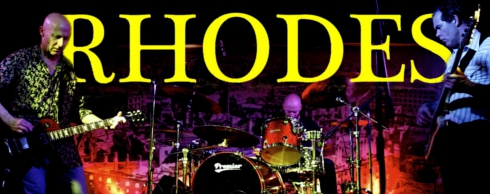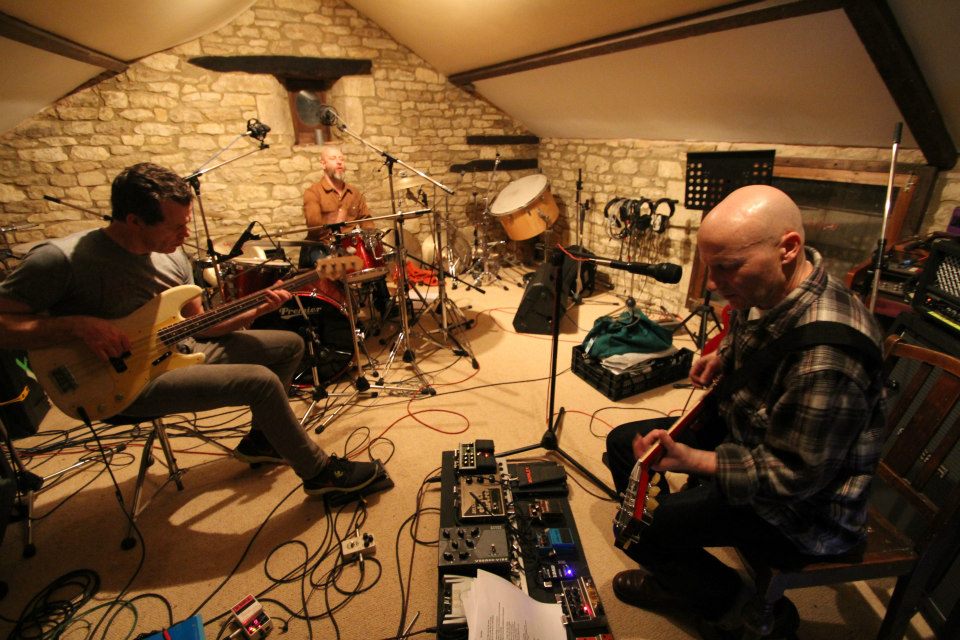


David Rhodes has released his second solo album. Not a solo album, actually. Things are a bit different than with Bittersweet. The core musicians who were with David in 2009 and went on tour with him later have formed the trio that recorded the new album. They are David Rhodes himself on guitars, Ged Lynch on drums and Charlie Jones on bass. When they found all other names either lacking in or overflowing with meaning they settled on "Rhodes" and also gave the album that name.
The sessions at which they recorded the songs in early 2013 were paid for through crowdfunding via the PledgeMusic website.
 Though that took a slow start it soon took off and the required sum was
made up quickly. Many Genesis fans contributed, as did the
genesis-news.com themselves. No wonder that the GNC folk paid special
attention as to how the project came along – after all, they were
personally involved, as it were...
Though that took a slow start it soon took off and the required sum was
made up quickly. Many Genesis fans contributed, as did the
genesis-news.com themselves. No wonder that the GNC folk paid special
attention as to how the project came along – after all, they were
personally involved, as it were...
With this support the band recorded a dozen songs, ten of which made it to the album. In Rhodes it is David Rhodes alone who wrote the songs and the lyrics. The music is much tighter than on Bittersweet, though. There is only bass, guitar and drums – no keyboards, no strings, no frills.
What has been carried over from Bittersweet are the depth and the quality. Strength and magic are probably good terms to describe the poles between which the music moves on Rhodes. There are straight rock numbers as well as a melancholy waltz and groovy guitar pop. David Rhodes' instrument plays a central role, of course. It is put to use in lots of different ways (frequently very loudly so) and receives the typical Rhodes tinkering. The rhythm group is at times energetic, at others sensitive, and Tchad Blake's accomplished mix adds that subtle special bit to the individual moods.
The lyrics have something of the thoughtful way of remorse and of picking oneself up again that we know from Bittersweet, but here they are a bit less striking. David Rhodes' phrasing seems quite unusual at times; the phrase „slipping by squeeze between the glass“ is pronounced contrary to all usual stress patterns. That actually makes it all the more interesting.
The album cover is another interesting thing – it shows a cow wearing a strap-on elephant trunk. David Rhodes explains it as a playful and surreal motive that brings up the question of identity: Can identity be changed? Are all attempts to do so merely a camouflage? Perhaps cows do dream of the savannah and the elephant's trunk is how they live out their dreams. In any case he wanted something colourful that would catch the eye.

The opener is a quick rock number with a light and driving rhythm and guitar lick, strong overdubs and a howling solo in the middle. The lyrics are vaguely self-contemplatory. The song showcases much of what the listener will encounter elsewhere on the album.
The second song is a grooving complaint, though the lyrics read more like a set of instructions. The rhythm track fits well to this; it is a bit aseptic, subdued and cool, while the guitar solo on the other hand saws loudly.
An eerie sequence of harmonies – it lulls you in comfortably yet it is subtly disconcerting at the same time. This is countered by an almost unrestrained chorus. The lyrics tell the familiar story of the ship of life that will sail into destruction without a helmsman. Rich atmospheres make the song very engaging.
The strong trio can do sensible, too. Demure instrumentation, a clever rhythm line and word associations paint a broad picture of easy, passionate longing. Acoustic, percussive, warm.
The straightest rock number on the album. Big grooving guitar and staccatos from both the bass and the drums drive this piece forward. It is almost hypnotic in its simplicity. As far as the content is concerned, Monkey On My Back continues Monster, Monster from Bittersweet to a certain degree.
David Rhodes played this song on the Bittersweet tour. A swinging foundation gets your feet a-tapping and takes you into a sexy chat-up number. The lyrics knit amusing double entendres that fit the bees' waggle dance as well as human mating rituals.
A gentle waltz. Acoustic guitars. Despite rather remorseful lyrics about a "time" that was "not on our side" the music exudes much imperturbability. With a regretful undertone. A confusing song that wins over its listeners perhaps even because of its inner calm.
This may well be the song on Rhodes where David contemplates his own life. He sings about a family growing, about years passing – and the enduring dream of a place full of peace and comfort. Add playful choir embellishments and gently advancing, simple guitar sounds. Three Is Everything is the song on Rhodes that has the most grace, placidity and acceptance of life.
A less flamboyant song. The blue ballon is to fly around the world and tell of the things it sees. It does so with static melodies and a chorus that does not stand out much from the verses. In the middle the song almost explodes.
A thoughtful piece at the end that still exudes shy optimism. Tentative and choppy verses are followed by a longing, gently rocking chorus that moves into a brute guitar solo with which the album ends. The last thing you hear is the guitar being unplugged from the amp.
The album is more recalcitrant than its predecessor, but Rhodes offers a big range of moods and thoughts. Reducing the music to a trio has directed it in the direction of Wave. Those who found Bittersweet Gabriel-ese in a way will now fall silent.
by Thomas Schrage, English by Martin Klinkhardt
How go get Rhodes: The album has been released as a download, CD and vinyl and could only be bought from PledgeMusic. At the moment it cannot be obtained from there anymore in any form.
There are plans to offer Rhodes as a download from Bowers & Wilkins as part of their Society Of Sound series.
David Rhodes has told us that if you would like to have the CD or the LP you can contact him on Facebook.
